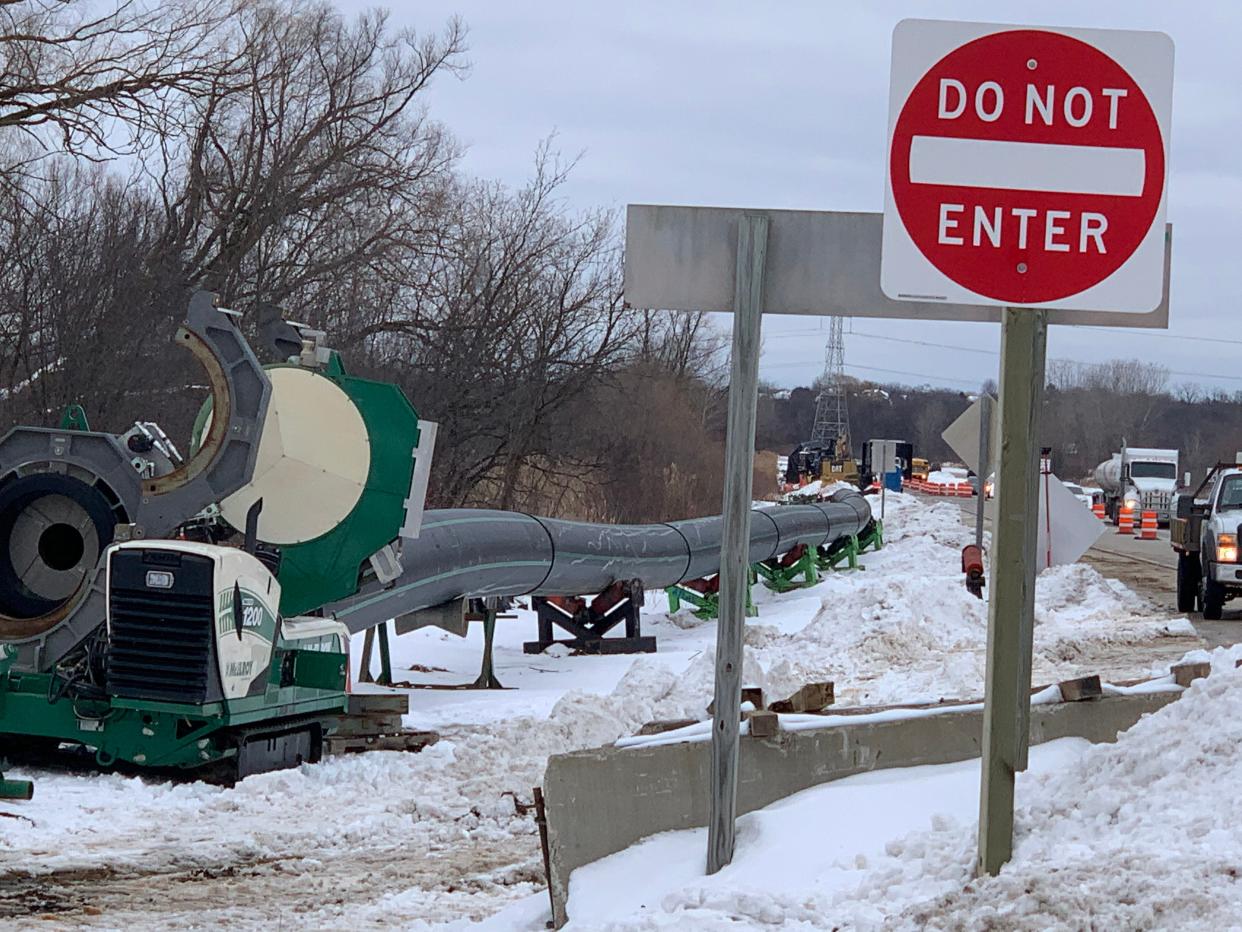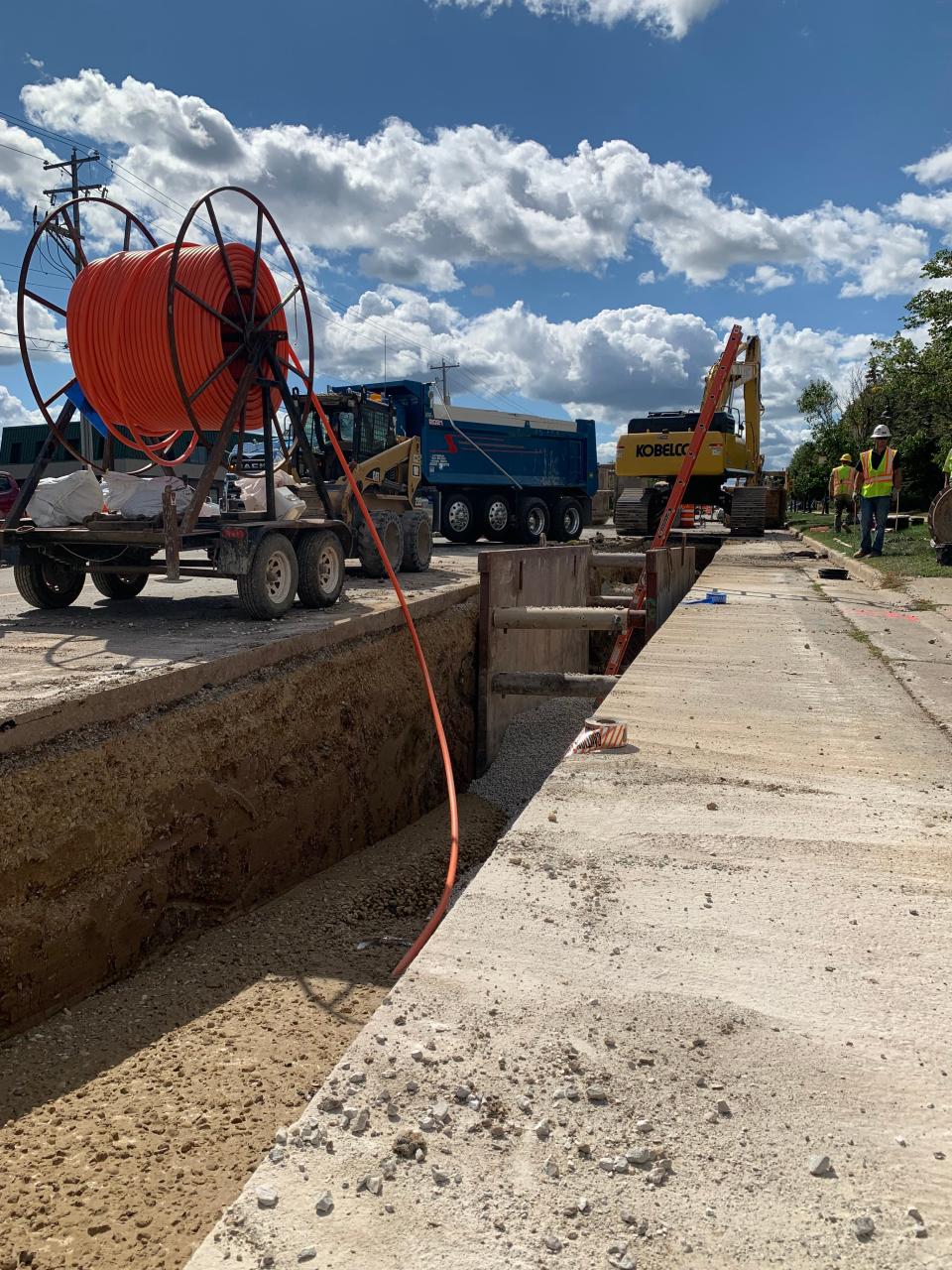Waukesha's Lake Michigan water pipeline project has remained on schedule despite supply chain issues

WAUKESHA - The city's new pipeline system that will supply water from Lake Michigan has remained on course for completion by September 2023, though several key construction elements remain.
Concerns about a faltering supply chain of materials hasn't made the project stress-free, but it helped that the effort, decades in the making and years in planning following a historic 2016 pact, began before coronavirus-related delays unraveled global and domestic production channels, city officials say.
"We are extremely pleased with the pace of construction for this project," said Dan Duchniak, general manager of Waukesha Water Utility. "We have run into some issues along the way, as expected for a project this size, however, the overall project is on schedule and slightly under budget."
To comply with a federal standard limiting the amount of naturally occurring radium in Waukesha's water supply, the city, a dozen years since it first opted to pursue Lake Michigan water, has been pushing ahead aggressively in the construction of the 36-mile system.
The $286 million project will divert lake water and negate the use of deep aquifer wells where the radium problem is rooted. The work also includes infrastructure that will return an equal amount of water to the lake via the Root River in Franklin, under the agreement with Great Lakes states and provinces which control the use of the lake's water outside its topographic basin.
Much of that work began in the fall of 2020 as two contractors worked on different parts of the system. Now, two years later, the work is more than three-fourths complete.
The project must be complete by September 2023
In each of five construction elements — the water supply pump station in Milwaukee; the water supply pipeline from Milwaukee to Waukesha, the Waukesha pumping station and reservoirs on East Broadway near Les Paul Parkway, the return flow pump station at the Clean Water Plant, and the return flow pipeline from Waukesha to Franklin — the project work remaining is limited mostly to one or two pieces, Duchniak said..
"All of these projects have been bid out and are under construction," Duchniak noted.
Much of the pipeline work was readily visible in 2021 as the holes were dug and the pipes sat above ground awaiting a complex process of snaking them into position.

The Milwaukee pump station, the first facility that will push Lake Michigan water on its way westward, is technically a project for the city of Milwaukee, with whom the city of Waukesha has an agreement to deliver water beginning next year. Duchniak said the underground work has begun and the foundation for the pump station itself has been laid, but the work is not expected to be completed until the second quarter of 2023.
The rest of the system is Waukesha's responsibility. The project officially broke ground two years ago but preliminary work upgrading the city's water lines years had been completed earlier once the historic agreement was reached in 2016.
The main water supply pipeline from Swartz and Coffee Roads in New Berlin to 92nd Street and Oklahoma Avenue at the southern edge of West Allis is complete except for some directional drilling that will take place this winter near National Avenue in West Allis, Duchniak said. Directional drills help contractors navigate around immovable obstacles, including wetlands and certain major underground utilities.
That leaves the pipeline from the Milwaukee pump station to 92nd Street and pipeline from Swartz Road to the Waukesha booster pumping station left on the to-do list this winter. Both segments are expected to be done by spring 2023.
The local pumping station — one of the more visible elements of the system clearly visible from Les Paul Parkway — "is coming along nicely and is on time," Duchniak said. The facility, with its two 8.6 million gallon reservoirs and elevated storage tank, will be complete by June 2023, he added.
Also of key importance is the return flow system, which must deliver 100% of the water drawn from the lake. The Clean Water Plant, where the wastewater is treated, is complete except for some motor drives on which the city is still awaiting delivery, Duchniak said.
The return flow pipeline is complete with the exception of two directional drilling projects — one at Interstate 43 and Racine Avenue in New Berlin and the other near 60th Street and Ryan Road in Franklin — that are expected to be done by March 2023.
"We are currently planning to switch water supplies from groundwater to surface water during the summer months of 2023," he said.
Supply chain problems mostly avoided
The project has always faced a deadline, which is why city officials have remained concerned about any delays, including supply chain issues that have challenged many businesses.
The system must be operational by Sept. 1, 2023. Noncompliance after that date could result in fines of up to $5,000 per well per day and for as long as the radium stays above the federal limit, according to state officials.
The deadline was set long before the coronavirus pandemic hit, which led to some problems with the water project.
The pump station drives haven't arrived yet, delaying the operation of the Clean Water Plant. Still, Duchniak expects delivery of those motor drives in December, leaving a cushion against the system's ultimate deadline.
Fortunately, the city got a leg up on the pandemic-related delays.
"We were lucky in the fact that we bid out these projects before or just as COVID was starting," he said.
In cases where materials were ordered after the supply chain broke down globally, the city has been lucky to date.
"As far as the reservoirs and booster stations go, we have not heard that there are supply chain issues affecting the materials at this point," Duchniak said.
That's a relief for the city, which he said is appreciative of the regional cooperation for helping Waukesha obtain a sustainable water supply.
"Given where we are at with all of these projects, I am confident that we will meet our schedule for radium compliance by September of next year," Duchniak said.
Contact Jim Riccioli at (262) 446-6635 or james.riccioli@jrn.com. Follow him on Twitter at @jariccioli.
Our subscribers make this reporting possible. Please consider supporting local journalism by subscribing to the Journal Sentinel at jsonline.com/deal.
DOWNLOAD THE APP: Get the latest news, sports and more
This article originally appeared on Milwaukee Journal Sentinel: Waukesha Lake Michigan pipeline project on schedule for 2023 deadline

